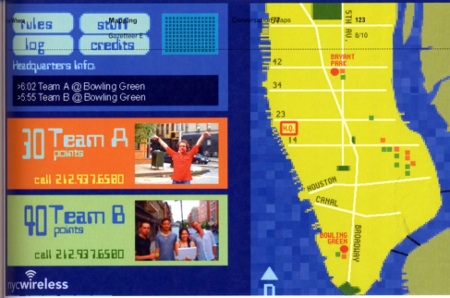



Featured image: Games/03 Paul Sermon, Peace Games, © der Künstler 2008.
Das Spiel und Seine Grenzen: Passagen des Spiels II ed. Mathias Fuchs and Ernst Strouhal, (Springer Verlag, 2010), German language only.
Fuchs, Mathias; Strouhal, Ernst (Hrsg.)
1st Edition., 2010, 272 S. 16 Abb., Softcover
ISBN: 978-3-7091-0084-4
Versandfertig innerhalb von 3 Tagen
Mathias Fuchs is considered to be one of the first artists to explore the combination of videogames and art. Today he is a senior lecture at Salford University in England and a leading researcher on Game Art and ludic interfaces. Social and political context in videogames and how they affect our society has been a major topic in Fuch’s research. Last year he published, together with Ernst Strouhal, an anthology of videogames and its borders and how this genre is changing and influencing society. The background to the anthology was an exhibition held at Kunsthalle Wien in 2008 about art and politics in videogames.

It has been 60 years since Johan Huizinga’s now classic book Homo Ludens, the playing human, was published. Games are no longer just entertainment; it’s a major industry that is affecting our society in every aspect. In the foreword Fuchs states that the main issue for the 15 essays in the anthology is how games have changed and affected our society both politically and socially since they crossed over from the realms of entertainment into everyday experience.
Today we can find many different genres in videogames, such as serious games and persuasive games, that discuss current issues, news and social problems, artistic games which address existential and aesthetic aspects, and so on. The gaming community has grown enormously and created on-line worlds with strong virtual economics, attached real world economics. In her essay Daphne Dragona says “The virtual environments of our times therefore can be seen as social institutions with social, political and economic values resembling those of real life.”
In a similar way Tapio Mäkelä’s essay about locative games describes how the gamescene has entered the real world in the form of cos-players and social gameplays where videogames as Pacman are performed in the city streets or games as “/Noderunner/, where participants run to find open WiFi Networks, take a photo of themselves at the location and send the info via e-mail to the project’s website.” This begins to close the gap between networks and everyday experience through the practice of social gaming. The game as object is less of an obvious conclusion now that technology enables us to explore ourselves within networked, gaming contexts and mobile technologies.

The borders between game and reality have now become even more blurred and integrated, especially if we consider how technology itself also crosses over into administrational activites which have already been traditional elements of controlling, processing parts of our lives. One example is how authorities around the world are supervising these new socio-economics, such as collecting taxes from virtual incomes by using similar tools and networks. There are many questions about how games will continue to affect and change our society in the future and the anthology takes an interesting and comprehensive look into what games have to offer and what could be potential threats to our future societies.
Today games are serious business. It is not impossible that in the future a bankruptcy of an on-line gameworld could shake the real world and create an economic depression. On the other hand, could on-line game economies bring prosperity and create new jobs, an economic boom in ways we have not witnessed before? If games move into a new period of changing social experience in even more connected ways than before, then we need to understand what the consequences of these are and how to navigate through this shifting terrain. One thing is for sure, it was a long time ago that games were just entertainment.
http://www.springer.com/new+%26+forthcoming+titles+%28default%29/book/978-3-7091-0084-4